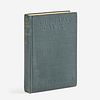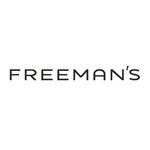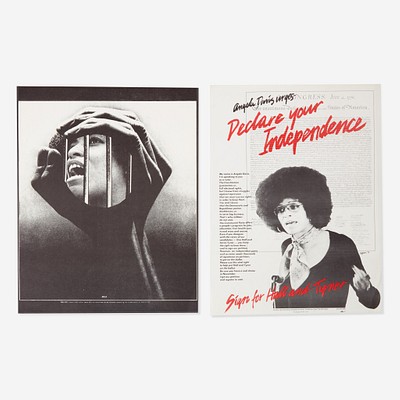[Literature] Fitzgerald, F. Scott The Great Gatsby
About Seller
2400 Market St
Philadelphia, PA 19147
United States
Established in 1805, Freeman’s Auction House holds tradition close, with a progressive mind-set towards marketing and promotion, along with access to a team of top experts in the auction business. And now with offices in New England, the Southeast, and on the West Coast, it has never been easier to ...Read more
Two ways to bid:
- Leave a max absentee bid and the platform will bid on your behalf up to your maximum bid during the live auction.
- Bid live during the auction and your bids will be submitted real-time to the auctioneer.
Bid Increments
| Price | Bid Increment |
|---|---|
| $0 | $25 |
| $500 | $50 |
| $1,000 | $100 |
| $2,000 | $200 |
| $3,000 | $250 |
| $5,000 | $500 |
| $10,000 | $1,000 |
| $20,000 | $2,000 |
| $30,000 | $2,500 |
| $50,000 | $5,000 |
| $100,000 | $10,000 |
About Auction
Sep 23, 2021
A collection of books and manuscripts. Curated by Darren WInston, Head of the Books and Manuscripts Department at Freeman's. Freeman's info@freemansauction.com
- Lot Description
New York: Charles Scribners Sons, 1925. First edition, second printing. 8vo. (vi), 218 pp. Presentation copy, inscribed by Fitzgerald on front free endpaper to his friend, Theodor Liedemedt: "For Theodor Liedemedt/In memory of that/week we went/rowing in a/bull-fiddle through/the lovely lakes of/Central Park, from/Stravinski/(Alias F. Scott/Fitzgerald)/May, 1885 "Stuttgart". Original dark blue-green cloth, front board stamped in blind, spine stamped in gilt, a few gilt letters chipped, slightly cocked, corners lightly worn; all edges trimmed; front hinge worn; tear at bottom of rear endpaper; booksellers ticket at bottom of rear paste-down.
First edition of F. Scott Fitzgerald’s masterpiece, The Great Gatsby—considered by some the Great American Novel—warmly and humorously inscribed to his musician friend, Theodor Liedemedt. Kept in Liedemedt’s family for 90+ years, family lore has the two first meeting on board a transatlantic ship crossing in the 1920s (Fitzgerald traveled to Europe in 1921, 1924, 1928, and 1929). Liedemedt was a working musician who performed on some of those crossings. He died in 1929, just making it to 30. Fitzgerald, older only by three years, just outlived his friend, dying in 1940 at 44.
A South New Jerseyian in the later part of his short life, Liedemedt was a German-born musician, arriving on American shores in 1915 during the First World War. He worked first on the crew of a German merchantman, interned in the Delaware River, then from June 1916 at a day job in Philadelphia. The United States entered the First World War officially on April 6, 1917, Liedemedt was detained by the FBI on April 7. They found he was not a threat to the United States, did not share the political convictions of his home country, and was released a few days later.
Scott Fitzgerald first came to New Jersey in 1911 when he attended the Newman School, a Catholic prep school in Hackensack. After graduating he attending Princeton University, only a few miles from Liedemedt’s stomping grounds, where Fitzgerald abruptly left in 1917 to join the American Army. Having avoided active service in Europe he moved to New York City and set out to become the writer we know today. Fitzgerald and Liedemedt were never much more than 80 miles from each other from Liedemedt’s landing in 1915 to his early death 14 years later. The nature of the inscription—knowing, familiar, full of inside references—points to an intimacy not in evidence anywhere else. There is no reference to Liedemedt in Fitzgerald’s archives and no letters survive between them.
A wonderful artifact from one of America’s greatest writers, never before offered on the market.
- Shipping Info
-
No lot may be removed from Freeman’s premises until the buyer has paid in full the purchase price therefor including Buyer’s Premium or has satisfied such terms that Freeman’s, in its sole discretion, shall require. Subject to the foregoing, all Property shall be paid for and removed by the buyer at his/ her expense within ten (10) days of sale and, if not so removed, may be sold by Freeman’s, or sent by Freeman’s to a third-party storage facility, at the sole risk and charge of the buyer(s), and Freeman’s may prohibit the buyer from participating, directly or indirectly, as a bidder or buyer in any future sale or sales. In addition to other remedies available to Freeman’s by law, Freeman’s reserves the right to impose a late charge of 1.5% per month of the total purchase price on any balance remaining ten (10) days after the day of sale. If Property is not removed by the buyer within ten (10) days, a handling charge of 2% of the total purchase price per month from the tenth day after the sale until removal by the buyer shall be payable to Freeman’s by the buyer. Freeman’s will not be responsible for any loss, damage, theft, or otherwise responsible for any goods left in Freeman’s possession after ten (10) days. If the foregoing conditions or any applicable provisions of law are not complied with, in addition to other remedies available to Freeman’s and the Consignor (including without limitation the right to hold the buyer(s) liable for the bid price) Freeman’s, at its option, may either cancel the sale, retaining as liquidated damages all payments made by the buyer(s), or resell the property. In such event, the buyer(s) shall remain liable for any deficiency in the original purchase price and will also be responsible for all costs, including warehousing, the expense of the ultimate sale, and Freeman’s commission at its regular rates together with all related and incidental charges, including legal fees. Payment is a precondition to removal. Payment shall be by cash, certified check or similar bank draft, or any other method approved by Freeman’s. Checks will not be deemed to constitute payment until cleared. Any exceptions must be made upon Freeman’s written approval of credit prior to sale. In addition, a defaulting buyer will be deemed to have granted and assigned to Freeman’s, a continuing security interest of first priority in any property or money of, or owing to such buyer in Freeman’ possession, and Freeman’s may retain and apply such property or money as collateral security for the obligations due to Freeman’s. Freeman’s shall have all of the rights accorded a secured party under the Pennsylvania Uniform Commercial Code.
-
- Buyer's Premium



 EUR
EUR CAD
CAD AUD
AUD GBP
GBP MXN
MXN HKD
HKD CNY
CNY MYR
MYR SEK
SEK SGD
SGD CHF
CHF THB
THB![[Literature] Fitzgerald, F. Scott The Great Gatsby](https://s1.img.bidsquare.com/item/l/9242/9242442.jpeg?t=1MmbGc)
![[Literature] Fitzgerald, F. Scott The Great Gatsby](https://s1.img.bidsquare.com/item/s/9242/9242442.jpeg?t=1MmbGc)











